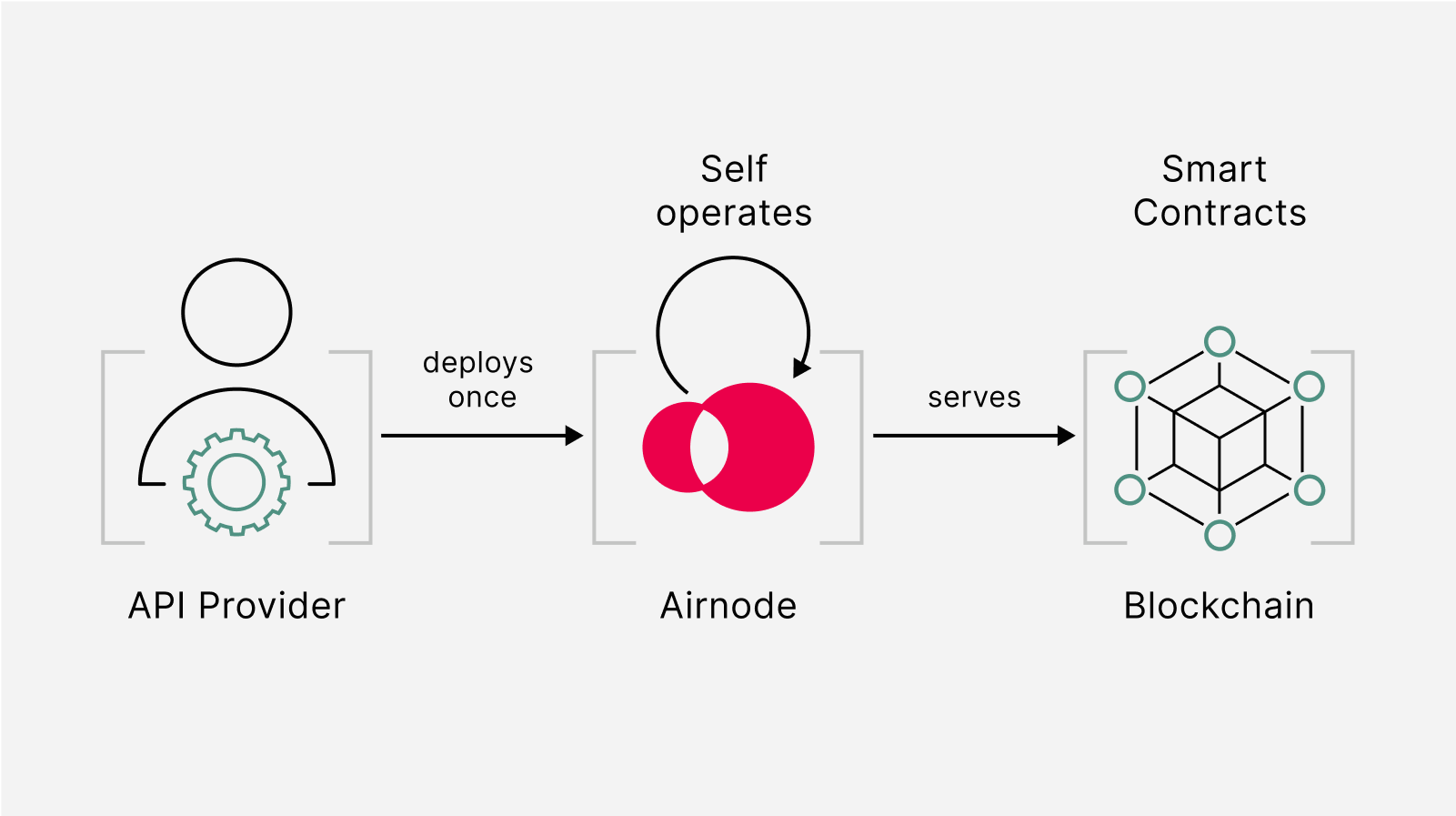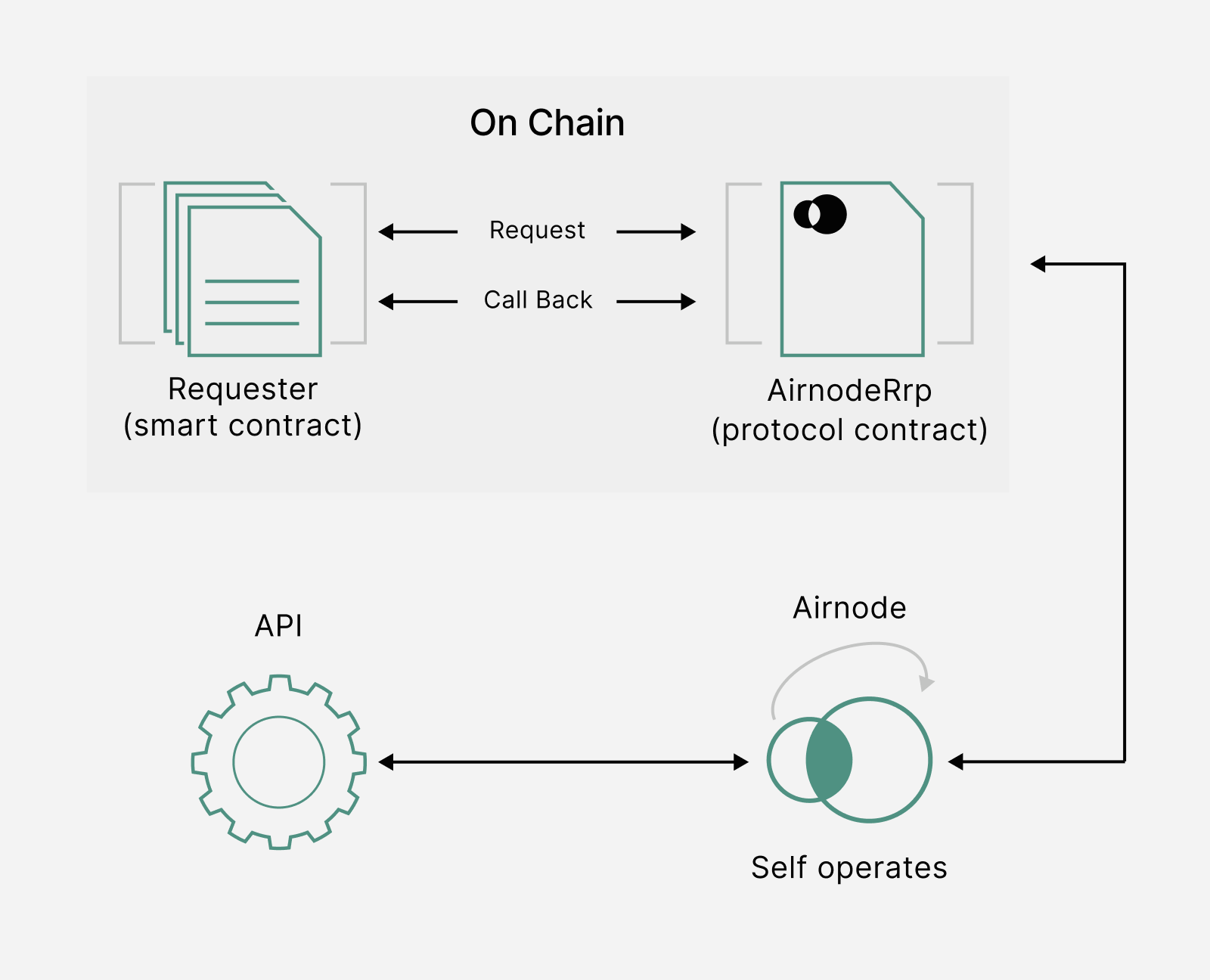API3
API3
API3 is a collaborative project to deliver traditional API services to smart contract platforms in a decentralized and trust-minimized way. It is governed by a decentralized autonomous organization (DAO), namely the API3 DAO.
Read more about how The API3 DAO works. Click here
Airnode
Developers can use Airnode to request off-chain data inside their Smart Contracts on Linea. An Airnode is a first-party oracle that pushes off-chain API data to your on-chain contract. Airnode lets API providers easily run their own first-party oracle nodes. That way, they can provide data to any on-chain dApp that's interested in their services, all without an intermediary.
An on-chain smart contract makes a request in the RRP (Request Response Protocol) contract (AirnodeRrpV0.sol) that adds the request to the event logs. The Airnode then accesses the event logs, fetches the API data and performs a callback to the requester with the requested data.

Requesting off-chain data by calling an Airnode
Requesting off-chain data essentially involves triggering an Airnode and getting its response through your smart contract. The smart contract in this case would be the requester contract which will make a request to the desired off-chain Airnode and then capture its response.
The requester calling an Airnode primarily focuses on two tasks:
- Make the request
- Accept and decode the response

Here is an example of a basic requester contract to request data from an Airnode:
pragma solidity 0.8.9;
import "@api3/airnode-protocol/contracts/rrp/requesters/RrpRequesterV0.sol";
// A Requester that will return the requested data by calling the specified airnode.
// Make sure you specify the right _rrpAddress for your chain.
contract Requester is RrpRequesterV0 {
mapping(bytes32 => bool) public incomingFulfillments;
mapping(bytes32 => int256) public fulfilledData;
constructor(address _rrpAddress) RrpRequesterV0(_rrpAddress) {}
/**
* The main makeRequest function that will trigger the Airnode request
* airnode: Airnode address
* endpointId: The endpoint ID for the specific endpoint
* sponsor: The requester contract itself (in this case)
* sponsorWallet: The wallet that will make the actual request (needs to be funded)
* parameters: encoded API parameters
*/
function makeRequest(
address airnode,
bytes32 endpointId,
address sponsor,
address sponsorWallet,
bytes calldata parameters
) external {
bytes32 requestId = airnodeRrp.makeFullRequest(
airnode,
endpointId,
sponsor,
sponsorWallet,
address(this),
this.fulfill.selector,
parameters
);
incomingFulfillments[requestId] = true;
}
// The callback function with the requested data
function fulfill(bytes32 requestId, bytes calldata data)
external
onlyAirnodeRrp
{
require(incomingFulfillments[requestId], "No such request made");
delete incomingFulfillments[requestId];
int256 decodedData = abi.decode(data, (int256));
fulfilledData[requestId] = decodedData;
}
}
The _rrpAddress is the main airnodeRrpAddress. The RRP Contracts have already been deployed on-chain. You can also try deploying it on Remix
| Contract | Addresses |
|---|---|
| AirnodeRrpV0 | 0xa0AD79D995DdeeB18a14eAef56A549A04e3Aa1Bd |
Request parameters
The makeRequest() function expects the following parameters to make a valid request.
airnode: Specifies the Airnode Address.endpointId: Specifies which endpoint to be used.sponsorandsponsorWallet: Specifies which wallet will be used to fulfill the request.parameters: Specifies the API and Reserved Parameters (see Airnode ABI specifications for how these are encoded). Parameters can be encoded off-chain using@airnode-abilibrary.
Response parameters
The callback to the Requester contains two parameters:
requestId: First acquired when making the request and passed here as a reference to identify the request for which the response is intended.data: In case of a successful response, this is the requested data which has been encoded and contains a timestamp in addition to other response data. Decode it using thedecode()function from theabiobject.
Sponsors should not fund a sponsorWallet with more then they can trust the Airnode with, as the Airnode controls the private key to the sponsorWallet. The deployer of such Airnode undertakes no custody obligations, and the risk of loss or misuse of any excess funds sent to the sponsorWallet remains with the sponsor.
API3 QRNG
API3 QRNG is a public utility we provide with the courtesy of Australian National University (ANU) and Quintessence Labs. It is powered by an Airnode deployed by both of these QRNG Providers, meaning that it is a first-party service. It is served as a public good and is free of charge (apart from the gas costs), and it provides ‘true’ quantum randomness via an easy-to-use solution when requiring RNG on-chain.
To request randomness on-chain, the requester submits a request for a random number to AirnodeRrpV0. The ANU/Quintessence QRNG Airnode gathers the request from the AirnodeRrpV0 protocol contract, retrieves the random number off-chain, and sends it back to AirnodeRrpV0. Once received, it performs a callback to the requester with the random number.
Click here to check out the AirnodeRrpV0 Address and QRNG Providers' Addresses on Linea.
Currently, only Quintessence Labs' QRNG Airnode is available on Linea.
Here is an example of a basic QrngRequester that requests a random number:
//SPDX-License-Identifier: MIT
pragma solidity 0.8.9;
import "@api3/airnode-protocol/contracts/rrp/requesters/RrpRequesterV0.sol";
contract RemixQrngExample is RrpRequesterV0 {
event RequestedUint256(bytes32 indexed requestId);
event ReceivedUint256(bytes32 indexed requestId, uint256 response);
address public airnode;
bytes32 public endpointIdUint256;
address public sponsorWallet;
mapping(bytes32 => bool) public waitingFulfillment;
// These are for Remix demonstration purposes, their use is not practical.
struct LatestRequest {
bytes32 requestId;
uint256 randomNumber;
}
LatestRequest public latestRequest;
constructor(address _airnodeRrp) RrpRequesterV0(_airnodeRrp) {}
// Normally, this function should be protected, as in:
// require(msg.sender == owner, "Sender not owner");
function setRequestParameters(
address _airnode,
bytes32 _endpointIdUint256,
address _sponsorWallet
) external {
airnode = _airnode;
endpointIdUint256 = _endpointIdUint256;
sponsorWallet = _sponsorWallet;
}
function makeRequestUint256() external {
bytes32 requestId = airnodeRrp.makeFullRequest(
airnode,
endpointIdUint256,
address(this),
sponsorWallet,
address(this),
this.fulfillUint256.selector,
""
);
waitingFulfillment[requestId] = true;
latestRequest.requestId = requestId;
latestRequest.randomNumber = 0;
emit RequestedUint256(requestId);
}
function fulfillUint256(bytes32 requestId, bytes calldata data)
external
onlyAirnodeRrp
{
require(
waitingFulfillment[requestId],
"Request ID not known"
);
waitingFulfillment[requestId] = false;
uint256 qrngUint256 = abi.decode(data, (uint256));
// Do what you want with `qrngUint256` here...
latestRequest.randomNumber = qrngUint256;
emit ReceivedUint256(requestId, qrngUint256);
}
}
The
setRequestParameters()takes inairnode(The ANU/Quintessence/Nodary Airnode address) ,endpointIdUint256,sponsorWalletand sets these parameters. You can get Airnode address and the endpoint ID here.The
makeRequestUint256()function calls theairnodeRrp.makeFullRequest()function of theAirnodeRrpV0.solprotocol contract which adds the request to its storage and returns arequestId.The targeted off-chain Airnode gathers the request and performs a callback to the requester with the random number.
You can try QRNG on Linea for free. Check out the all the QRNG Providers for Linea here.
Click here to read more about API3 QRNG
Additional Resources
Here are some additional developer resources